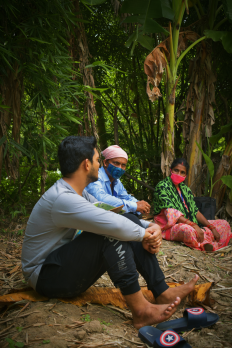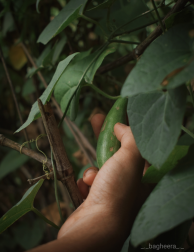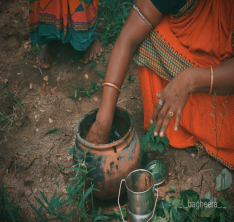Towards A Greener Revolution: Redefining Agriculture in Post COVID era
- Sital Kumar
- Oct 27, 2021
- 4 min read
Updated: Feb 14, 2023
Sital Kumar, a student at Ashoka University shares his Verghese Kurien Rural Internship experience, where he interned with the National Coalition for Natural Farming (NCNF) and explored narratives of small-scale farmers practicing natural farming.
Why the internship?
In the Spring of 2020 at Ashoka University, I took a course on Agriculture, Food and Sustainability. The course delved deep into agro-economy, supply chains, food processing, and Agro systems. While doing the course, I realised that the present system is unsustainable, with devastating environmental impacts. As a political science student, interested in the intersectionality of agriculture, food systems, and state regulation, I was drawn towards the Verghese Kurien Rural Internship.
My deep dive into natural farming
My internship was with the National Coalition for Natural Farming (NCNF), a network of different stakeholders engaged in the practice, promotion, and scaling of natural farming in India. Working as a research intern, in the first few weeks, I went through materials related to agriculture, agroecology, food chains, markets, and the undercurrents of the natural farming movement. I was supported and mentored by many team members during this process. Following the introductory phase, I worked with all team members on various projects, with each project presenting a unique learning opportunity.
Understanding the role of networking in creating solidarity
Natural farming is supported by pioneering individuals- farmers, activists and spokespersons, and organisations that support the cause. To transform the grievances into a widespread mobilisation of demands, networking, exchange of resources, information, documentation and cooperation among the stakeholders are essential. NCNF anchors itself with this task of coordinating and collaborating at a national scale. In the initial part of the internship, I assisted in creating a national database of natural farms and farmers, which could act as a communication template.

Similarly, the NCNF team is working to create a state-wise compendium of practices, taking into account the various ecological zones and cropping patterns. I documented the stories of different farmers who have succeeded in their transition to natural farming. These stories act as inspiration for new farmers. Later, I engaged in networking activities by initiating interaction between different organisations in three different regions -- East, North-East, and South.
This was the most important and demanding part of my internship. Coordinating with senior members who have worked longer than my life in such sectors was intimidating and tricky. However, the coordination process was an immersive learning experience. I could engage in interactions on wide-ranging topics, including lively discussion about farmers, working structure, policy mapping, challenges on the field, and the states’ impact on all these junctures. Hosting the North-Eastern regional event on 23rd July provided a platform for collaboration, resource sharing, mobilization, and celebration of Natural Farming practices. When tasked with collecting and curating audio-visual inputs for the anniversary event, I was exposed to multiple languages, cultures, and livelihoods. On a personal level, it sensitized me towards my consumption patterns and ideas of modern living.
How are champion farmers practicing natural farming?
My internship allowed me to witness different facets of natural farming as a social movement. In my understanding, the natural farming movement is a response to the current crisis of agriculture. Many of the farmers I conversed with, both on and off the field, expressed their willingness and interest in shifting to natural farming if provided with relevant support (knowledge and finances). Farmers actively participated in learning, creating innovations, sharing resources and taking initiatives to promote natural farming. They realised, natural farming can potentially challenge prevalent farming systems that are dependent on chemical inputs, capital investment, land ownership, gender norms and exploitative labour.
1. In conversation with Farmers exhibiting her field with a Multi-Layer Farming set-up
2. Pointed Gourd ready for harvest.
3. Crop Diversity supports local fauna.
4. Preparation of a hybrid fertilizer Handi Khata
According to Sobha Muduli, a farmer from the Khordha district of Odisha, whom I interviewed during my field visits, Natural farming provided her with safe and nutritious food which she can proudly feed to her 3-year-old grandson. To other farmers, it means a stable income. For Pranati Nayak, a widowed farmer, natural farming is a low investment pathway of steady income for her family of two children even during the most uncertain times of the pandemic. For some others, natural farming harks back to a pre-Green Revolution period, with both aesthetic and cultural significance attached. Mrs Sulochana Parida, a 60-year-old farmer, fondly remembers the taste and aroma of unique recipes from her childhood that she can recreate, thanks to the naturally grown local varieties of cereals, pulses and vegetables.
Working towards amplifying state support

As part of the internship, I was also able to witness first-hand the kind of discussions necessary to catalyse state support. As a moderator of the Regional Meetings on natural farming, I collected data on grievances and demands of different NGOs. A big step in generating traction among the upper echelons of the bureaucracy were two events. The first being - Seeds for a vegetable garden, chaired by Ram Mohan Mishra, secretary of the Ministry of Women and Child Development. The event was aimed at the promotion of natural farming and nutritional security via Kitchen Gardens (Poshan Garden). The second event was the Policy Consultation event organised as a part of NCNF’s first-anniversary celebration. The panelists were many notable Policy Makers including Dr. Rajiv Kumar, the vice-chairman of NITI Ayog. The meetings concluded with brilliant insights on the policy front at different levels of production and consumption. I was tasked with the social media coverage and post-event record-keeping for these events, which allowed me a deeper insight into significant comments by the advisors.
Towards a Greener Revolution
Towards the end of the internship, especially while writing this blog, I began to reflect on the significance of natural farming. What was the role of natural farming for the people engaged? While I framed natural farming as a social movement in the making, it might be different altogether for people. For the farmers, it was an alternative for better livelihood; for women in the households, it meant empowerment; for some activists it meant an active resistance while for others it was something else. With my continuous engagement with different stakeholders on and off the field for the last three months, I concluded that irrespective of the nature of engagement, Natural farming is a revolutionary change in our food production and consumption paradigm. Natural farming alters the nature of humans and labour by bringing us closer to our food systems and nature.
Sital Kumar is a student at Ashoka University

_edited.jpg)










Comments